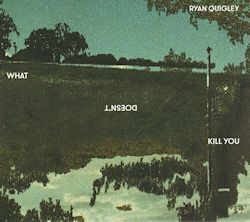 BUY NOW AmazonUK AmazonUS |
RYAN QUIGLEY What Doesn't Kill You |
Prologue
Doctor Stage
Fire Eyes
What Doesn't Kill You
Green Light
The Long Journey Home
Intro To Hymn To Their Homeland
Hymn To Their Home land
Say What You See
Epilogue
Ryan Quigley - Trumpet
Paul Booth - Tenor sax, alto flute
Steve Hamilton - Piano, Fender Rhodes
Michael Janisch - Double bass
Clarence Penn - Drums
Although born in Derry, County Londonderry, trumpeter Ryan Quigley was raised in Scotland and has been prominently associated with the jazz scene there. He is Jazz Trumpet Tutor and a director of the Big Band at the Royal Scottish Academy of Music and Drama. He made an early start on the trumpet at age 11 and was exposed to the music of Miles Davis, Clifford Brown and Maynard Ferguson during his teens. A more recent influence on trumpet has been that of Dave Douglas. He is a composer and arranger as well as a sought-after performer. He is known for his work with classical orchestras, alongside his jazz commitments. The latter have included at various times his involvement with the reeds and brass quartet, Brass Jaw, and membership of the BBC Big Band, Tim Garland's Underground Orchestra and the Scottish National Jazz Orchestra. He has also toured with his own Big Band. Currently London-based, Quigley's first album under his own name was released in 2008. Given his abilities, it's something of a surprise that we've had to wait so long for his second album as leader. Here he is joined by award-winning English saxophonist, Paul Booth, the versatile Steve Hamilton (pianist with the SNJO) and two Americans, both London-based. Clarence Penn brings experience and dexterity to his work on drums while Michael Janisch is the founder of Whirlwind records as well as a producer, composer, arranger and bassist!
The title track, What Doesn't Kill You, is blessed with a strong theme combined with sterling individual performances from the band members. There's a thoughtful yet penetrating contribution from Quigley on trumpet while Booth alternates between the silky and the more raucous. Hamilton, meanwhile, is engaging on the Fender Rhodes, Janisch eminently reliable on bass and Penn nimble on drums. Another fine piece of collaborative improvisation from the ensemble is the hypnotic Green Light, where I thought the solid underpinning given by Janisch, and the expressive and cultivated touch of Hamilton, were particularly noteworthy. The exciting Doctor Stage isn't far behind for quality. Booth on tenor provides a bustling, even hectic, solo on tenor and, for his part, Quigley delivers pace and flair. Penn gives a first rate account of himself on drums. The group certainly has a dependable engine room. Fire Eyes is a calmer piece and was easy on the ear. I did, however, feel it was a work in progress, building towards a destination, rather than complete in itself. The excellent sense of cohesion between the band members is further demonstrated on tracks such as the jauntyThe Long Journey Home and the funky Say What You See. Hymn To Their Homeland is prefaced by a short introduction of almost two minutes duration by Janisch. He uses it as an occasion for a ruminative, technically adept, pizzicato solo. The full track which follows has Booth on alto flute and is altogether pleasing. The album is topped and tailed by a Prologue and Epilogue from Quigley, the latter melancholy in mood. With the exception of the solo by Janisch for Intro To Hymn, which the bassist wrote, all the music on the disc was composed by Quigley.
The spirit of bebop lives on in this CD. Part of the strength of jazz is the way the tradition can be revisited and, renewed, unapologetically used as a springboard for contemporary music-making. Ryan Quigley and his fellow musicians succeed triumphantly in that challenge.
James Poore